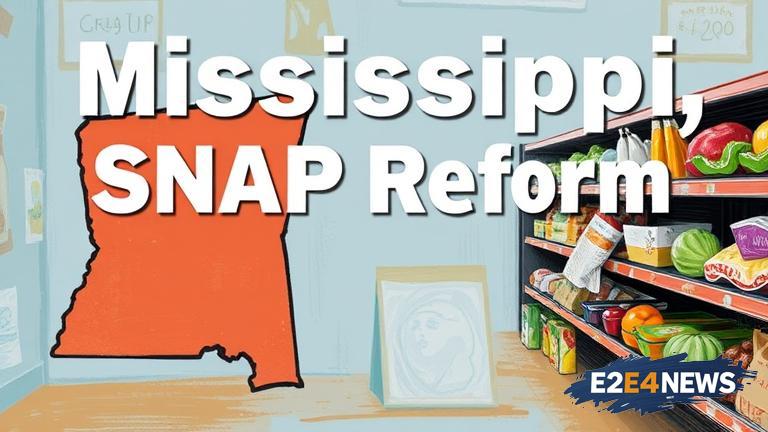A recent report has shed light on the potential benefits of reforming the Supplemental Nutrition Assistance Program (SNAP) in Mississippi. By removing junk food from the program, the state could save millions of dollars in the long run. The report highlights the importance of promoting healthy eating habits among low-income families, who are often disproportionately affected by diet-related health issues. SNAP, formerly known as food stamps, is a federal program that provides financial assistance to eligible individuals and families to purchase food. However, the program has been criticized for allowing the purchase of unhealthy foods, including junk food and sugary drinks. The report suggests that by restricting the types of foods that can be purchased with SNAP benefits, Mississippi could reduce the prevalence of obesity, diabetes, and other diet-related health problems. This, in turn, could lead to significant cost savings for the state’s healthcare system. The report estimates that removing junk food from SNAP could save Mississippi up to $10 million per year. Additionally, the report highlights the potential benefits of promoting healthy eating habits among children, who are more likely to develop healthy habits if they are exposed to nutritious foods from a young age. The report also notes that many other countries have implemented similar reforms to their food assistance programs, with positive results. For example, Mexico has implemented a tax on sugary drinks, which has led to a significant reduction in consumption. Similarly, Chile has implemented a law that requires food manufacturers to label their products with warning labels if they exceed certain thresholds for sugar, salt, and saturated fat. The report suggests that Mississippi could learn from these examples and implement similar reforms to its SNAP program. Furthermore, the report highlights the importance of education and outreach in promoting healthy eating habits among low-income families. The report suggests that the state could provide cooking classes, nutrition education, and other resources to help families make healthy food choices. The report also notes that the state could work with local food retailers to increase access to healthy foods in low-income communities. This could involve providing incentives for retailers to stock healthy foods, or implementing programs to support local food production and distribution. Overall, the report suggests that reforming the SNAP program to promote healthy eating habits could have a significant impact on the health and wellbeing of low-income families in Mississippi. By removing junk food from the program and promoting healthy food choices, the state could save millions of dollars in healthcare costs and improve the overall health of its citizens. The report’s findings are likely to be of interest to policymakers, healthcare professionals, and advocates for public health. As the state considers reforms to its SNAP program, it is likely that the report’s recommendations will be taken into account. In addition to the potential cost savings, the report highlights the importance of promoting healthy eating habits as a key component of overall health and wellbeing. By providing access to healthy foods and promoting education and outreach, the state can help to reduce the prevalence of diet-related health problems and improve the overall health of its citizens. The report’s findings are also likely to be of interest to other states, which may be considering similar reforms to their own SNAP programs. As the nation continues to grapple with the challenges of obesity, diabetes, and other diet-related health problems, the report’s recommendations are likely to be seen as a key component of any comprehensive solution. In conclusion, the report suggests that removing junk food from the SNAP program in Mississippi could have a significant impact on the health and wellbeing of low-income families in the state. By promoting healthy eating habits and providing access to healthy foods, the state can help to reduce the prevalence of diet-related health problems and improve the overall health of its citizens. The report’s findings are likely to be of interest to policymakers, healthcare professionals, and advocates for public health, and are likely to inform any future reforms to the SNAP program in Mississippi.
